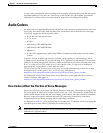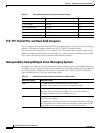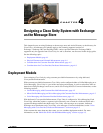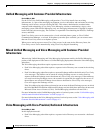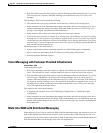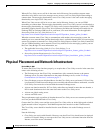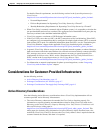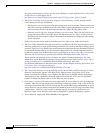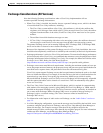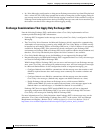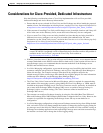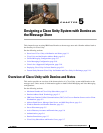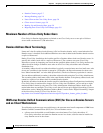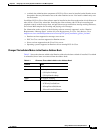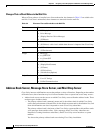
4-7
Design Guide for Cisco Unity Release 5.x
OL-14619-01
Chapter 4 Designing a Cisco Unity System with Exchange as the Message Store
Considerations for Customer-Provided Infrastructure
Exchange Considerations (All Versions)
Note the following Exchange considerations when a Cisco Unity implementation will use
customer-provided Exchange infrastructure:
• When Cisco Unity is installed, the installer chooses a partner Exchange server, which is the home
of several default Cisco
Unity mailboxes, including:
–
The Cisco Unity system mailbox (alias: Unity_<ServerName>), which is the mailbox that
originates voice messages from outside callers. (Voice messages from Cisco
Unity subscribers
originate from the mailbox of the caller.) Each Cisco
Unity server must have its own system
mailbox.
–
The mailbox from which broadcast messages are sent.
–
If Cisco Unity is interoperating with other voice messaging systems, the mailboxes that send
voice messages to and receiver voice messages from the other voice messaging systems.
The partner Exchange server can be running Exchange 2007, Exchange 2003, or Exchange 2000,
and it can be either a clustered or non-clustered Exchange server.
Because of the importance of the partner Exchange server in a Cisco Unity installation, the server
should be selected primarily on the basis of availability and secondarily on the basis of performance.
• Exchange performance is critical to Cisco Unity performance. To ensure that Exchange performance
will not adversely affect Cisco
Unity, we recommend that customers assess the performance of their
Exchange infrastructure before installing Cisco
Unity. For example, the Microsoft TechNet article
Exchange Server 2003: Ruling Out Disk-Bound Problems
(
http://technet.microsoft.com/en-us/library/aa997558.aspx) can provide useful guidance.
• Exchange servers must meet Microsoft requirements, including the maximum number of users per
server, the proper amount of memory, the proper processors and processor speed, hard disks that can
meet disk-access response times, and placement of data files and transaction log files.
Cisco Unity cannot support Exchange servers that have performance bottlenecks such as slow hard
drives or insufficient memory. For example, if slow hard drives or the lack of a dedicated mirror for
transaction logs cause delays in recording log transactions, MAPI access (which is used by
Microsoft Outlook, Exchange, and Cisco
Unity to access Exchange) will be temporarily suspended
until the transaction buffers can be cleared to a certain level. This can substantially delay phone
access to Cisco
Unity.
• The Cisco Unity Voice Connector for Microsoft Exchange, which is required for communicating
with another voice-messaging system by using AMIS, the Cisco
Unity Bridge, or VPIM, must be
installed on the partner Exchange server. The Voice Connector can also, optionally, be installed on
one or more other Exchange 2000 or Exchange 2003 servers to optimize message routing via
Exchange’s native, cost-based routing. (The Voice Connector cannot be installed on an
Exchange
2007 server.)
• For information on the impact of audio codecs on Exchange, see the “Audio Codecs” section on
page 3-5.
• In a Voice Messaging configuration, to prevent the message store from filling the hard disk, some
customers configure storage limits in Exchange, and use Cisco
Unity Message Store Manager to
delete old messages. For example, messages older than 30 days might be moved to the
deleted-messages folder, and messages older than 60 days might be purged. For more information
on Message Store Manager, see the Message Store Manager Help at
http://ciscounitytools.com/HelpFiles/MSM/MSMConsoleHelp_ENU.htm.



